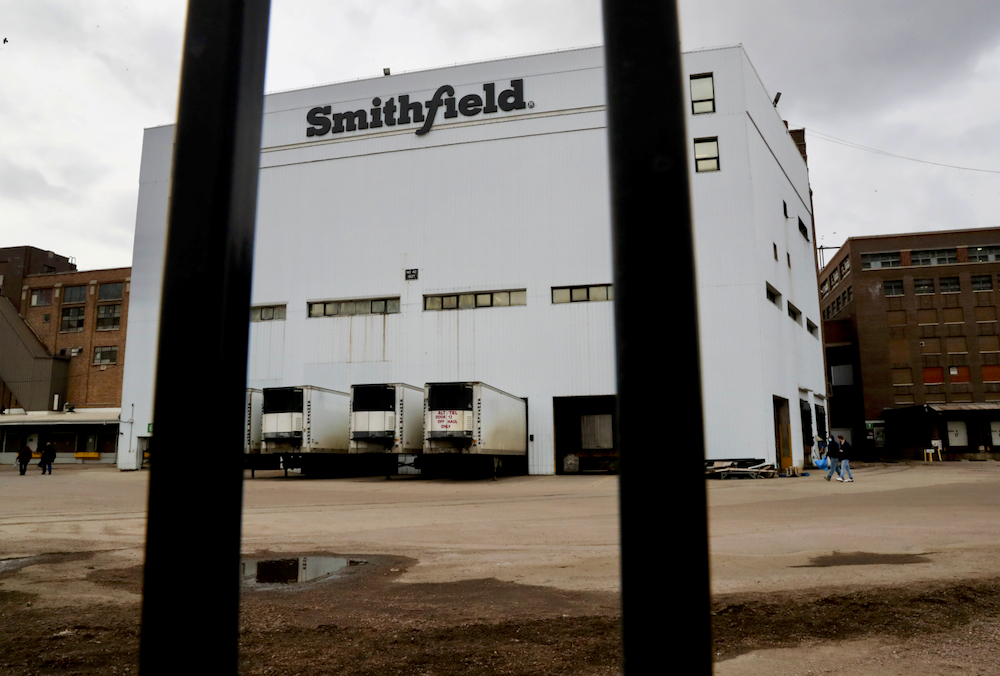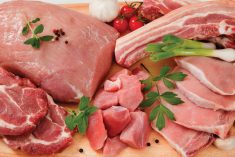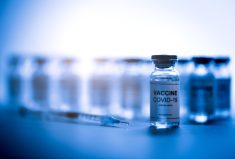Reuters – Smithfield Foods, the world’s largest pork producer, last year assigned a team of dedicated employees to enforce social distancing and sanitize surfaces at a South Dakota slaughterhouse where COVID-19 infected nearly 1,300 workers, the president of the local labour union said.
Now, that role no longer exists, the company confirmed.
The plant gradually moved employees who worked as safety monitors to other positions, said BJ Motley, president of the United Food and Commercial Workers (UFCW) union branch that represents Smithfield workers in Sioux Falls, South Dakota.
Read Also

Trade uncertainty, tariffs weigh on Canadian beef sector as market access shifts
Manitoba’s beef cattle producers heard more about the growing uncertainty they face as U.S. tariffs, and shifting trade opportunities, reshape their market.
Smithfield, which is owned by Hong Kong-listed WH Group Ltd., said it shifted the monitors’ duties to other personnel starting in the second quarter of this year because COVID-19 safety protocols became “second nature” and vaccines were available. As for cleaning, the company said facilities are “routinely sanitized for food safety reasons.”
Across the country, U.S. meat and chicken plants that reported some of the country’s largest coronavirus outbreaks last year have eased or adjusted protective measures implemented near the start of the pandemic, according to interviews with 10 plant employees, union officials and advocates for workers.
Safety concerns in slaughterhouses, where employees are often in close quarters, have made it harder for meat processors to hire and retain workers at a time when labour is already scarce and demand is booming.
Meat companies including Smithfield, Tyson Foods Inc. and JBS USA say employee health is a top priority and that they require masks in plants, even though many states have relaxed COVID-19 mask and social distancing rules.
Workers and advocates say the companies could do more as the contagious Omicron variant rages and soaring meat prices boost profits.
“We don’t have anybody monitoring social distancing. We don’t have anybody wiping tables down. It’s really back to normal,” Motley said.
About 59,000 meat-packing workers were infected with COVID-19 through January at U.S. plants run by Smithfield, Tyson, JBS, Cargill Inc. and National Beef Packing Company, a U.S. House of Representatives subcommittee report said in October in the most comprehensive data to date.
Smithfield said it invested more than US$800 million to protect employees from COVID-19 and follows federal health and safety guidelines.
The U.S. Occupational Safety and Health Administration cited Smithfield in 2020 for failing to protect Sioux Falls workers from COVID-19 and said last month the company agreed to assess its operating procedures as part of a settlement. Smithfield said the citation was without merit last year.
Along with masks, Smithfield uses barriers between work stations and social distancing “when feasible” to keep employees safe, spokesman Jim Monroe said.
“We have in no way rolled back COVID-19 safety protocols,” he said. “We are confident that our protective measures are effective in mitigating COVID-19 illness among our employees.”
A Smithfield plant in Vernon, California, operating under the name Farmer John, stopped having employees work as social distance monitors roughly three months ago, said Darryl Blackwell, a UFCW steward who slices fat from pork in the plant. He would like to see them return.
“It’s pretty much do whatever you want as far as the social distancing,” he said. “With this new variant, you just can’t be too cautious.”
Smithfield confirmed it shifted monitors’ duties to other workers. The company did not provide data about vaccination rates. It said Smithfield hosted about 200 on-site vaccine drives that include boosters and that shots are widely available.
“Our vaccination and case rates are excellent,” Monroe said.
Motley estimated the South Dakota plant is about 60 per cent vaccinated, compared with a rate of about 65 per cent nationwide. He and Blackwell said boosters had not been offered at their facilities.
Rival meat processor JBS USA, owned by Brazil’s JBS SA, started staggering employees’ break times at slaughterhouses last year as a way to promote physical distancing. In July 2021, the company stopped the practice at a massive beef plant in Greeley, Colorado, the UFCW Local 7 union branch that represents plant workers said.
“Unless they do reconstruction of the plant or they slow down the line speeds, they’re still elbow to elbow in the plant,” said Kim Cordova, president of UFCW Local 7.
Company spokeswoman Nikki Richardson said JBS kept the vast majority of COVID-19 protocols in place and adjusts procedures as it evaluates cases among employees and in the community.
The Greeley plant has reported more than 400 cases of COVID-19 among workers, including 19 since Oct. 25, 2021, state data shows.
JBS said the Greeley plant has an 80 per cent vaccination rate and 35 per cent have received boosters, while 86 per cent of all its workers are vaccinated. New hires must be vaccinated.















